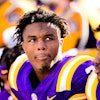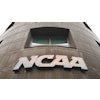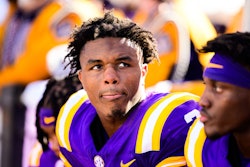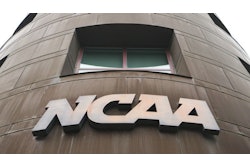JACKSON, Miss. – The grave academic failures of Southwestern Athletic Conference (SWAC) schools have crippled some of the league’s most popular, revenue-generating programs heading into the football season.
Three SWAC schools, Jackson State, Southern and Grambling, have received postseason bans in either football or men’s basketball for failing to meet the NCAA’s Academic Progress Rate standards. The APR is the NCAA’s gauge for academic performance, awarding points for academic eligibility and retention.
Southern became the first school banned from the postseason in both football and basketball for APR issues.
Administrators, coaches and players say the embarrassing situation must change, and change quickly in the SWAC, which is made up of predominantly historically Black colleges and universities.
It won’t be easy. Over the past few decades, much of the success and notoriety has faded for these HBCUs which have produced football giants like Jerry Rice, Walter Payton and Eddie Robinson. The reasons are many and sometimes complicated, including a lack of financial resources and integration.
Southern football coach Stump Mitchell said none of that matters.
“One thing I know that the NCAA doesn’t want to hear about is a lack of resources, we can’t do this or we can’t do that,” Mitchell said. “We’ve got to figure out a way to get this done.”
But the reality for these cash-strapped schools is the postseason bans are another harsh setback. Jackson State and Southern will miss the football postseason while Southern and Grambling will miss the men’s basketball postseason. All three schools also have lost scholarships and practice time. The three programs are arguably the most popular and successful in the 10-team league, with passionate fan bases that often travel well.
Nonetheless, the SWAC’s presidents took the NCAA’s ban a step further in hopes their efforts will turn a short-term loss into a permanent solution.
Since the SWAC doesn’t compete in the NCAA’s Football Championship Subdivision playoffs, the league presidents extended the NCAA’s ban to the conference championship game. The SWAC’s presidents also voted to ban Southern and Grambling from the conference basketball tournament. That policy will extend to any other teams that are banned by the NCAA in the future.
SWAC Commissioner Duer Sharp said the decision wasn’t difficult.
“It wasn’t a lot of fun and nobody wanted to do it, but I absolutely believe we did the right thing for the league by sending a message that we must meet the NCAA’s standards,” Sharp said. “We know there are challenges, but we must get better.”
The three schools must improve quickly. The next punishment in the NCAA’s four-step APR process is its most severe: Restricted membership, which would mean losing Division I status.
And meeting those standards is not getting any easier. The NCAA recently approved a measure that would increase the needed four-year minimum rolling average from 925 to 930.
Jackson State, Southern and Grambling all submitted APR improvement plans to the NCAA this summer. Sharp said plans for the individual schools vary slightly, but all include reallocating resources to concentrate more on academics and also raising grade point average requirements for incoming transfers and freshmen.
Finding ways to produce the needed APR gains dominated the SWAC’s summer meetings.
Bernard Franklin, the NCAA’s executive vice president for student-athlete affairs, met with the presidents and athletic directors from the SWAC and Mid-Eastern Athletic Conference to discuss some of the issues unique to HBCUs.
He said the most common issues have been a lack of stability in leadership, academic mission and a lack of financial resources. But he doesn’t see them as insurmountable.
“The academic performance program was never established to be a punitive process,” Franklin said. “We want these schools to succeed.”
And that could start impacting how coaches in the conference recruit.
Mississippi Valley football coach Karl Morgan said he understands the need for reform, but academic performance alone won’t keep coaches employed.
“Let’s face it, we have to win,” Morgan said. “And to do that at this level, most of our schools rely on transfers from BCS schools and second-chance kids. But we’ve got to be more careful. (The changes) make you less inclined to take kids you might think are an academic risk, that’s for sure.”
But Prairie View A&M President George Wright said that philosophy is not consistent with academic mission statements throughout the conference. To him, including his school in with the likes of Duke, Stanford and the Ivy League doesn’t make sense.
Wright worked as a professor and administrator at Duke, Kentucky and Texas before arriving at Prairie View.
“I’m very proud of Prairie View’s academics, but part of our mission is to provide education for the underserved and to provide second chances,” Wright said. “Our athletes are consistently exceeding the graduation rates of our regular students. But then the NCAA says we’re not doing our job. That’s where I say wait a minute you’re making us out to be some kind of failures. I just don’t believe that’s true.”
The gulf in financial resources at HBCUs continues to be gigantic, and the gap between them and BCS schools widens every year.
While BCS schools have millions to spend on academic endeavors for athletes, SWAC schools must be much more frugal. The University of Mississippi’s athletic budget for the upcoming fiscal year is about $47 million, a number that does not include all private donations. Jackson State’s budget is just over $6 million.
With such minimal funding, there aren’t many resources for the presidents to reallocate to fix the problem.
Jackson State quarterback Casey Therriault said he noticed a few changes around campus after the APR announcement, including more tutors and more reminders to keep grades up. But when it’s all said and done, Therriault said players and coaches need to get it done themselves.
“We have to be responsible for us,” Therriault said. “Seniors have to show freshmen how it’s done and there’s got to be personal accountability. Nobody holds your hand at this level. We’re the ones responsible for making this situation better, getting rid of the knuckleheads and making sure we leave Jackson State in a good spot.”















